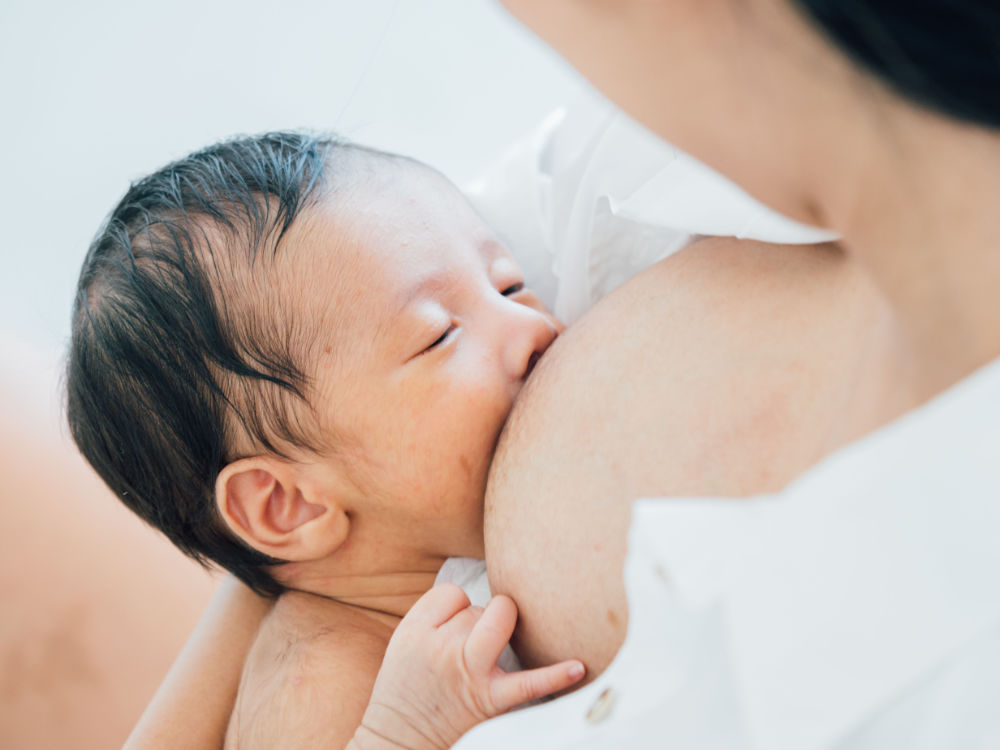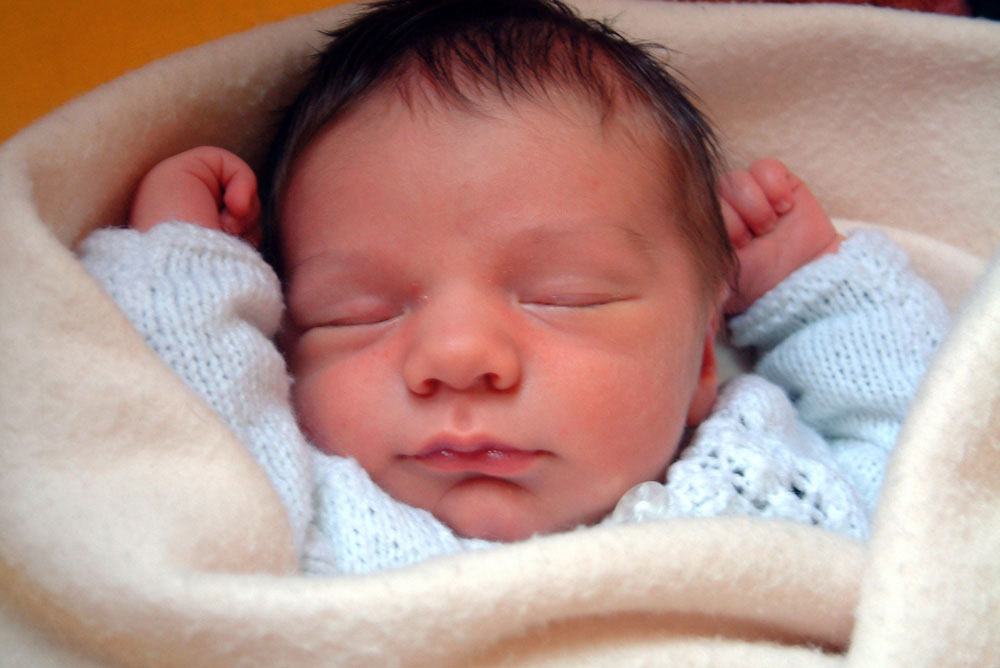It’s not recommended to drink alcohol during pregnancy1 but what about breastfeeding and drinking alcohol? Most breastfeeding resources agree that drinking small amounts of alcohol occasionally while breastfeeding won’t hurt your baby but that drinking a lot on a regular basis may be harmful. How much is a small amount and how much is a lot? This article looks at the recommendations around breastfeeding and drinking alcohol and answers frequently asked questions.

#1 Does alcohol get into breast milk?
Alcohol passes into a mother’s breast milk reaching the same levels as measured in the mother’s blood. The amount of alcohol moving into blood and breast milk is very low compared to the alcohol consumed.2 Dr Jack Newman, a Canadian paediatrician and breastfeeding author explains:
Depending on the jurisdiction, you are considered too drunk to drive with more than 0.05% to 0.1% alcohol in your blood. Alcohol behaves differently from other drugs. The concentration of alcohol in blood and breastmilk is about the same. So, if the mother has 0.06% alcohol in her blood, she will have 0.06% alcohol in her milk—one-tenth that of de-alcoholized beer! This is not a concentration of alcohol that is going to make the baby sick or cause brain damage (as some have suggested).
#2 Can you drink alcohol while breastfeeding?
Official advice says drinking occasionally34 or up to one unit of alcohol a day5 is unlikely to affect the breastfed baby but drinking above recommended limits could be harmful for both mother and child.
LactMed explains:
Casual use of alcohol (such as 1 glass of wine or beer per day) is unlikely to cause either short- or long-term problems in the nursing infant, especially if the mother waits 2 to 2.5 hours per drink before nursing, and does not appear to affect breastfeeding duration.
#3 How long does alcohol stay in breast milk?
Alcohol levels are their highest (peak) in breast milk about 30-60 minutes after drinking or after 30-90 minutes if food is eaten at the same time.6 After this high point, the concentration of alcohol gradually falls—unless the mother has another drink.
General guidance
As a general rule, a couple of hours after having a single drink —i.e. one unit of alcohol—most of the alcohol will have left the mother’s breast milk (and her blood) because alcohol is not stored in the breast.7 The more alcoholic drinks (units of alcohol) a mother has, the longer it takes for her body to clear the alcohol.
What is a unit of alcohol?
Units of Alcohol. One unit of alcohol is approximately a single (25ml) measure of spirits, half a pint of beer or half a standard (175ml) glass of wine, although it depends on the strength of the drink. For more guidance see Drinkaware’s Alcoholic unit calculator or Alcohol Change UK’s Unit calculator.
What factors affect alcohol levels in breast milk?
The exact time interval for alcohol to clear from an individual mother’s breast milk (and blood) depends on:
- How many units of alcohol the mother has drunk (fewer units will be cleared more quickly)
- The mother’s body weight (heavier individuals metabolise alcohol more quickly than lighter individuals)
- Whether the mother has eaten food with the alcohol (see box)
- How quickly alcohol is broken down (metabolised) in the mother’s body. One study suggests that ethanol is broken down more quickly in lactating women8
The Academy of Breastfeeding Medicine 9 refers mothers to the Motherisk Program’s table which gives estimated time intervals for alcohol to clear from breast milk taking both the units of alcohol consumed and mother’s body weight into account. The less you have drunk and heavier you are, the quicker your body can metabolise the alcohol. Examples from the table include:
- A nine stone woman (125lb/57kg) is estimated to metabolise one unit of alcohol from her breast milk in 2.5 hours (2 hours 27 minutes) and four units in about 9 hours and 49 minutes.
- A twelve stone woman (170lb/77kg) is estimated to metabolise one unit of alcohol from her breast milk in about two hours (2 hours 5 minutes) and four units in eight hours 23 minutes.
Food and alcohol. Eating before drinking alcohol reduces and delays the time taken for the concentration of alcohol to reach its highest level in the blood. Consuming alcohol with food also reduces the total amount of alcohol absorbed into the blood and how quickly it can be eliminated from the body (LactMed, 2023).

#4 How can alcohol affect breastfeeding?
Drinking regularly or heavily can affect;
- Milk release (let-down)—ie how easily milk is released from the breast 1011
- Milk supply—ie how much milk is available 12
- A mother’s capacity to care for her baby. Drinking alcohol can affect a mother’s capacity to look after her baby, particularly enough alcohol to make her feel disorientated or be sick (NHS, 2022). More than two units of alcohol at once could affect a mother’s judgement and functioning.13 If a mother is planning on binge drinking eg having more than six units of alcohol, the NHS says your baby should be cared for by an adult who hasn’t been drinking. You may need to express your milk to stay comfortable and prevent engorgement (NHS, 2022). It is not safe to fall asleep with your baby when you are affected by alcohol. the Breastfeeding Network explains:
It is vital that mothers who have been drinking alcohol should never let themselves be in a situation where they might fall asleep with the baby; on a bed, chair or settee (this would also apply to other carers who have been drinking alcohol). The place of sleep is a bigger risk than the fact that the mother has been drinking unless her consumption has been very high.
Drinking alcohol reduces the ability of the mother to be aware of her baby’s needs, whether she is breastfeeding or not. It is safest to ask someone else to care for the baby.

#5 How can alcohol affect my breastfed baby?
Drinking regularly or heavily could mean;
- A breastfed baby may be more sleepy, have deeper sleep, weakness or decreased growth (Hale, 2020; Jones, 2021).
- Younger babies are not able to break down (detoxify) alcohol as easily as older babies or adults so may be more sensitive to the effects of alcohol in breast milk (Fisher, 2006).
- Alcohol may affect the smell and flavour of breastmilk and may be associated with babies getting less milk.14
The Womanly Art of Breastfeeding summarises:
…babies don’t metabolise alcohol nearly as well as adults do, and when there’s alcohol in the milk they seem to take less milk than they would otherwise. Combine that with the slowed milk release that can result from alcohol, and your supply and your baby’s growth can be compromised if you drink substantial amounts regularly. A beer or a glass of wine a couple of times a week is unlikely to matter, and the effects decrease as your baby gets older.
What you can do
If you want to minimise the alcohol your baby gets, try breastfeeding right before you have a drink—your milk will be alcohol-free again within two or three hours.
#6 How much can you drink when breastfeeding?
Opinions vary on how much alcohol can be consumed by a breastfeeding mother to ensure her milk supply and breastfed baby are unaffected. Official advice is that occasional drinking is not likely to be harmful (see #2 above). Comments on higher amounts include:
- LactMed says that drinking more than two units of alcohol every day seems to shorten the length of time a baby is breastfed but the long-term effects on a breastfed infant are not clear:
Daily heavy use of alcohol (more than 2 drinks daily) appears to decrease the length of time that mothers breastfeed their infants. The long-term effects of daily use of alcohol on the infant are unclear. Some evidence indicates that infant growth and motor function may be negatively affected by 1 drink or more daily, but other studies have not confirmed these findings. Heavy maternal use may cause excessive sedation, fluid retention, and hormone imbalances in breastfed infants. Greater or riskier alcohol consumption by nursing mothers may affect their children’s academic performance negatively in school.
- Breastfeeding medications author Thomas Hale says a mother’s alcohol blood levels would need to reach 300mg/100ml to see significant side effects in the breastfed baby (Hale, 2020). Website drugs-info.co.uk equates 200–300mg/100ml blood level to 15-20 units of alcohol (7-10 pints of beer) noting that after drinking this amount most people would have passed out.15 The Breastfeeding Network explains:
maternal blood levels have to reach 300mg/100ml before mild sedation is reached in the baby (this compares with a level of 80mg/100ml needed to fail the police breath test in England, Wales and N. Ireland; 50mg/100ml Scotland.
Alcohol Change UK and UK’s National Health Service recommend drinking no more than 14 units per week spread over three or more days as general guidance for everyone.1617
#7 How much alcohol could affect milk supply and let-down?
Alcohol inhibits oxytocin release, an important breastfeeding hormone, which affects the let-down ( milk ejection reflex) and the amount of milk delivered to the baby (Hale, 2020). Opinions differ on the amount of alcohol that could affect let-down from two units to more than six units:
- In one small study, Mennella et al observed a significant decrease in oxytocin, after the equivalent of two units of alcohol18
- LactMed says five drinks or more can decrease the milk let-down and disrupt breastfeeding (LactMed®, 2023)
- Breastfeeding and medications author Thomas Hale says that to affect a mother’s let-down, 1.5 to 1.9 g/kg alcohol will need to be consumed (Hale, 2020). According to Lundgaard et al 19 alcohol consumption of 1.5 g/kg is “binge level” and NHS describes binge drinking as more than 6 units of alcohol in one drinking session (NHS, 2022).
Hale’s Medications and Mothers’ Milk and LactMed review research studies in more detail.
Although traditional beers were historically thought to be helpful to a mothers’ milk supply, alcohol has not been shown to be helpful. For more information about traditional beers see Beer and Breastfeeding.
#8 How can I reduce the effects of alcohol on my baby?
To minimise the alcohol a baby gets, a mother could avoid breastfeeding for two or three hours after she has had a drink (NHS, 2022). Some experts advocate waiting two hours before breastfeeding for every unit of alcohol consumed (Hale, 2020) but others feel this may be overly cautious as the actual amounts of alcohol moving into breast milk are very low20. Denise Fisher, IBCLC makes the following recommendations to reduce a baby’s exposure to alcohol:
- minimising alcohol exposure to the infant for at least the first 3 months of life
- choosing low alcohol [or non alcoholic!]drinks
- eating beforeand while drinking
- avoiding breastfeeding for 2 to 3 hours after drinking
- storing alcohol-free breast milk for use after moderate or heavy drinking
#9 Do I need to pump and dump?
There is no need to use a breast pump to remove and throw away your breast milk after having an alcoholic drink. The alcohol will naturally leave the milk in your breasts of its own accord and pumping or hand expressing won’t hurry the process (Jones, 2021; NHS, 2022). However, if your breasts become full during the waiting period (see #3 above), you may need to express to comfort to avoid engorged breasts. Any milk you express during the waiting period will still contain alcohol (the alcohol won’t disappear from the milk as it does in the breast).
Summary
Small amounts of alcohol move into breast milk when a breastfeeding mother has an alcoholic beverage. The concentration of alcohol peaks in breast milk about 30-60 minutes after the drink is consumed and then the levels gradually fall if the mother doesn’t have another drink. A couple of hours after having one unit of alcohol, the alcohol will have mostly left your breast milk. Drinking small amounts of alcohol occasionally won’t affect your breastfed baby, however drinking regularly or heavily may affect your milk supply and/or your let-down reflex, make your baby sleepy or affect their growth.
*Book extract reproduced by permission from Pinter & Martin.